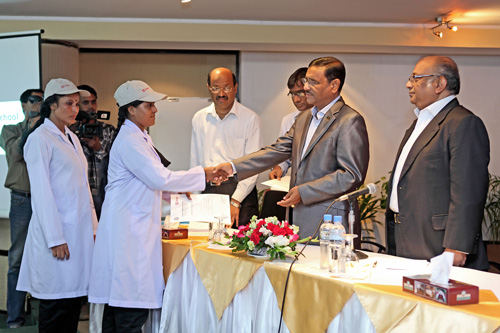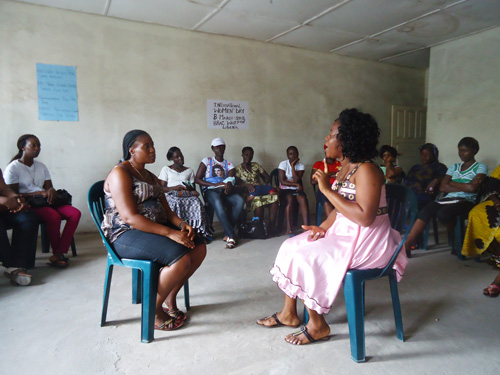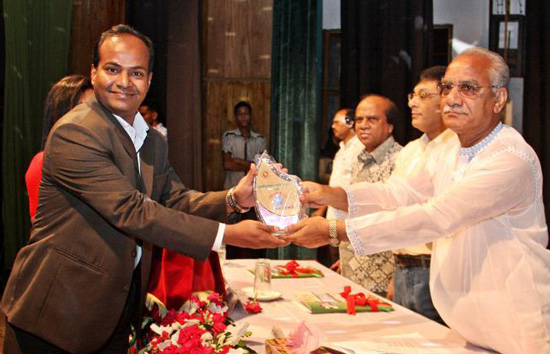
News (830)
BRAC Family Mourns the Untimely Demise of Dr. Sajia
.jpg) 04 November 2012, Dhaka. Dokhinkhan BRAC Clinic’s part-time physician, Dr. Sajia Afrin Eva, 27, was brutally murdered on Friday; November 30, 2012 during her duty hour (Inna Lillahi Wah Inna Ilaihi Raziun). BRAC family is deeply shocked and mourns at the sudden demise of Dr. Sajia.
04 November 2012, Dhaka. Dokhinkhan BRAC Clinic’s part-time physician, Dr. Sajia Afrin Eva, 27, was brutally murdered on Friday; November 30, 2012 during her duty hour (Inna Lillahi Wah Inna Ilaihi Raziun). BRAC family is deeply shocked and mourns at the sudden demise of Dr. Sajia.
Following a high level management meeting, BRAC authority has decided to provide all out financial and legal support to the deceased family to run and facilitate free and fair judgment of the murder case filed by her father, Monirul Islam, in addition to providing financial compensation to Dr. Sajia’s family.
Dr. Sajia started working at BRAC Health Clinic, Dokkhinkhan as a part time doctor from Ocrober, 2012. She had graduated from Sylhet Osmani Medical College and was undergoing advance post graduate training at Shaheed Sarawardi Medical College Hospital.
BRAC authority will hold a Doa & Milad Mahfil at its head office, BRAC Centre located at 75 Mohakhali, Dhaka on December 05, 2012 at 4.00pm for the eternal peace of the departed soul.
BRAC authority strongly condemns the untoward incident that took life of Dr. Sajia Afrin Eva and wants the real criminals to be brought under the law ensuring justice to the deceased.
The role of social innovation in developing countries
24 October 2012, Dhaka. Sir Fazle Hasan Abed, Founder of BRAC to speak at the next Cambridge Leadership Seminar.
Cambridge Judge Business School is pleased to welcome Sir Fazle Hasan Abed, Chairman and Founder of BRAC, as speaker at the next Cambridge Leadership Seminar taking placeon Friday 26 October.
In his talk, Sir Fazle will address the role that social innovation plays in his organisation BRAC, which he established to alleviate poverty and empowerment of the poor and has now grown to become the largest development organisation in the world in terms of scale and He will also look at why innovation is one of the most important challenges facing managers around the world and how in the current environment the idea of frugal or ‘Jugaad’ innovation has rapidly caught the attention of managers and leaders.
Sir Fazle will also talk about his role of social enterprises, one such innovation, which played a key role for the growth and sustainability of BRAC.
Having received numerous awards, including the D. Rockefeller Bridging Leadership Award (2008), the Inaugural Clinton Global Citizen Award (2007), the PKSF Award for Lifetime Achievement in Social Development and Poverty Alleviation (2007), Gates Award for Global Health (2004), and UNICEF’s Maurice Pate Award (1992), Sir Fazle is also recognised by Ashoka as one of the ‘global greats’ and is a founding member of the Global Academy for Social Entrepreneurship.
Commenting on Sir Fazle’s impending visit, Professor Jaideep Prabhu, Nehru Professor of Indian Business at Judge Business School, said: “Sir Fazle and BRAC, the organisation he founded and leads, are legends in the world of development and innovation. We are honoured and delighted to have him visit Cambridge Judge Business School and speak to our faculty and students as there is so much we can learn from him.”
View Sir Fazle Hasan Abed’s profile:
http://www.brac.net/content/leadership-fazle-hasan-abed-founder-chairperson
Sir Fazle Hasan Abed, Founder of BRAC, analyzes key issues in poverty alleviation
06 October 2012, Madrid, Spain. On October 5, 2012 Sir Fazle Hasan Abed, founder of BRAC, one of the largest development NGOs, gave a lecture at IE School of Arts & Humanities, in which he analyzed the key issues in poverty alleviation. BRAC currently operates in 10 countries in Asia, Africa, and the Caribbean, and its work touches the lives of an estimated 126 million people. Sir Fazle Hasan Abed was joined by Arantza de Areilza, Dean of IE School of Arts & Humanities, and Javier Gila, President of the Asociación AIDA – Ayuda, Intercambio y Desarrollo.
In 1972, Bangladesh was the second poorest country in the world. Back then, Sir Fazle Hasan Abed created BRAC with the aim of improving people’s living standards and education. In order to do this, BRAC focused its work on marginalized groups, especially women, who, in the words of Sir Fazle Hasan Abed, “tend to have fairly realistic outlook on situations”. As an example of best practices, BRAC promoted the intervention of experts by interviewing mothers in order to understand the reasons behind such a high mortality rate in Bangladesh. The findings concluded that most children died due to dehydration caused by diarrhea. BRAC also implemented a plan to promote ways to reduce the country’s high birth rates. To do so, it was crucial to know and understand the “beliefs, wishes, and thoughts” of the population, Sir Fazle Hasan Abed recalled.
In addition to reducing infant mortality and fostering ways to lower Bangladesh’s high birth rates, over the past decades, BRAC has also played an active role in the field of education, key factor in a country’s socioeconomic development. Moreover, BRAC runs one of the largest private school systems in the world, with over a million students. During his lecture at IE School of Arts & Humanities, Sir Hazle Hasan Abed pointed out that, “at BRAC schools, students learn to think”. BRAC has also established a joint program in Education and Leadership with Columbia University geared toward Bangladeshi government officials. Sir Abed likewise insisted in the importance of promoting community development, “empowering those in need so that they can find solutions to their own problems”.
Finally, BRAC has also established a financial institution focused on financing small and medium enterprises. BRAC Bank has grown to become the fifth largest bank in Bangladesh. Sir Fazle Hasan Abed closed his lecture by saying that, “to me business opportunities exist only if they entail improving, developing, or helping someone or something”.
BRAC gives certificate to 21 professional woman drivers

18 September 2012, Dhaka. Twenty one trained women drivers received certificates from the Communication Minister, Obaidul Quader MP, on the occasion of “Promoting Women in Driving Profession” event held on September 18, 2012. This successful first batch of BRAC driving school has finished a rigorous eight weeks of residential driving training and is now ready to be employed.
Congratulating BRAC on this initiative, the minister said “These certified trained female drivers will face no problem in getting employment as Nitol Niloy group has already agreed to recruit them along with BRAC”. Director of BRAC Procurement, Estates and Management Services, Mr Ahmed Najmul Hussain, mentioned in his keynote presentation that research conducted by BRAC shows 42 percent of the drivers know the basic traffic regulations , whereas 41 percent actually follows them. Identifying the huge lack of properly trained drivers in the country he mentioned, “BRAC will train 400 instructors and 600 female drivers through this driving school project with the support of Bangladesh Road Transport Authority (BRTA)”.
Additional Inspector General of Police, Mr Nazmul Haque, and Chairman of BRTA, Mr Md Ayubur Rahman Khan, was present at the event as special guests. Group CFO of BRAC Mr Shib Narayan Kairy, and Senior Director Mr Asif Saleh spoke among others. The event was chaired by Managing Director of BRAC investments, Mr Muhammad A (Rumee) Ali.
Daniel Ng wins BRAC's Innovation Competition
BRAC’s first-ever Facebook competition is officially over! Congratulations to our winner, Daniel Ng from the University of Virginia on his ‘Play’ Project– a community playground project with the objective of creating safe accessible spaces for underprivileged children to play.
“Wow, thank you so much for choosing me! I feel so honored and fortunate and excited to be able to work with such a renowned organization as BRAC,” says Daniel. “I had no expectations of winning since I knew I was competing against very qualified and remarkable people. I still can't believe I won.” Daniel is a freshmen who’s interested in studying Global Development and Statistics.
A special mention goes out to our runners up; Maya – a community empowerment project for women, and Amadeyr Cloud’s digital content delivery project.
In January, we received over 40 submissions from around the world and finally narrowed it down to seven best innovations with potential to be implemented at BRAC. We convened several internal judging panels to make our final decision. The winner gets the unique opportunity to work with BRAC’s Social Innovation Lab in Bangladesh. We thank all our participants for their submissions and look forward to organizing similar projects in the future.
“This was our first attempt to organize a Facebook contest and the response was great! The quality of the submissions we received was very impressive,” stated Mr. Asif Saleh, BRAC’s Director of Communications and the Social Innovation Lab. “We look forward to having similar events in the future to not only foster innovation, but get people thinking more seriously about some of the social problems we face today.”
BRAC gears up to assist Sierra Leone as the country encounters the worst cholera outbreak in the last 15 years
04 September 2012, Dhaka. On Thursday, 16 August, the government of Sierra Leone declared the cholera outbreak a national humanitarian emergency. A presidential taskforce was established shortly after the declaration. As of 24 September, Sierra Leone has recorded over 14,000 cases and 240 deaths in 10 out of 13 districts.
BRAC has taken up various measures to ensure full assistance to the affected and distraught in Sierra Leone. In collaboration with the country's district health management teams (DHMT), we are providing the necessary support to disseminate cholera prevention messages through our network of 660 community health promoters (CHP) and 33 programme assistants in the Western area, Port Loko, Bombali, Tonkolili, Bo, Kenema, and Kono districts.
We are providing approximately SLL 43 million (USD 10,000) as cash grant for immediate emergency support and mobilising our human resources to provide the DHMTs with the following services:
- Promoting and distributing oral rehydration solution (ORS) aqua tabs and disinfectants through the CHPs
- Arranging regular health meetings in communities to influence behavioural change
- Providing refreshers training on cholera preparedness to the CHPs who are assisting to disseminate cholera prevention messages
- Providing DHMTs with necessary tools and supplies such as, IV ringers lactate, ORS, Doxacycline capsules, zinc and disinfectants
The DHMTs have requested for further assistance from BRAC in raising community awareness in distant chiefdoms to ensure a greater coverage.
"In this critical time, we remain committed to doing our best to help the government of Sierra Leone contain the epidemic by mobilising both human and additional financial resources, and using our knowledge in dealing with communicable diseases through a community-based approach," said Faruque Ahmed, Senior Director of BRAC International.
BRAC started its operation in Sierra Leone in 2008, and has reached over 700,000 Sierra Leoneans with activities in microfinance, agriculture, livestock, poultry, health and legal services. We are a global leader in creating large-scale opportunities for the poor, touching the lives of an estimated 126 million people – a global movement bringing change to 10 countries in Asia, Africa and the Caribbean.
Help us address the humanitarian emergency in Sierra Leone by making a donation at http://www.brac.net/donations/view
Lessons Learned Sharing Session on “Social Mobilization and Accountable Local Governance towards Creating MDG Unions”
01 September 2012, Dhaka. A Lessons Learned Sharing Session on “Social Mobilization and Accountable Local Governance towards Creating MDG Unions” – a joint initiative of BRAC Community Empowerment Programme and The Hunger Project-Bangladesh, was held on Wednesday, 29th August 2012 at VIP Lounge, National Press Club, Dhaka.
Dr. Akbar Ali Khan, former Adviser of the Caretaker Government was the Chief Guest at the session. We were also honored to have Ms. Shaheen Anam, Executive Director, Manusher Jonno Foundation and Mr. Hasan Mazumdar, Country Representative, The Asia Foundation, as Special Guests, and Dr. Tofail Ahmed, Adviser, Local Governance, UNDP, Professor Salahuddin M Aminuzzaman, Ph.D, Department of Public Administration, University of Dhaka, and Ms. Shanaz Arefin, National Coordinator, Local Governance Project, SHARIQUE as Guest Speakers. Dr. Badiul Alam Majumdar, Global Vice President and Country Director, The Hunger Project-Bangladesh presented the keynote paper of the programme, while the session was inaugurated by Ms. Anna Minj, Director, Community Empowerment Programme and Integrated Development Programme, BRAC. The session was chaired by Dr. Mahabub Hossain, Executive Director, BRAC. Present at the occasion were nearly 200 participants, including Union Parishad representatives, project beneficiaries, representatives from government-nongovernment organizations, policy makers, journalists, and members of the civil society.
External evaluation of BRAC West Africa Health programmes
26 August 2012, London.

Community health promoters doing role play at a refreshers training for malaria prevention at a BRAC branch in Paynesville, Monrovia, Liberia.
BRAC UK recently commissioned and facilitated an external evaluation of BRAC Liberia and BRAC Sierra Leone’s health programmes.
Since starting the programme in late 2008, BRAC has established a combined network of nearly 1,300 community health volunteers and staff in both countries delivering essential health care services in five key areas: reproductive healthcare;
Malaria control; TB control; family planning; and basic curative services.
The programme reaches a population of more than half a million people in Liberia (20 districts) and close to 800,000 people in Sierra Leone (7 districts).
Independent consultant, Sybil Bailor, who conducted the evaluation, ensured that all stakeholders were involved in the process including key partners in government and civil society, and local leaders and community participants. In the executive summary, she wrote:
“BRAC is seen as a valued partner in health in Liberia and Sierra Leone. The essential healthcare model implemented by BRAC is unique in the way it actually delivers practical and real health care in the community based on tried and tested methods improved over many years in Bangladesh and other parts of the world where poverty, war, and conflict have completely eroded the formal health system.”
The report made recommendations for including: the need for a simpler referral system to community health volunteers and increase uptake of government services; the opportunity for more malaria and tuberculosis treatment as part of the community healthcare approach; and the need for a publicity strategy to raise awareness of BRAC’s work in health, agriculture and livelihoods.
For a copy of the report, please email This email address is being protected from spambots. You need JavaScript enabled to view it.
PACE supported approaches - one of the top ten innovations
25 July 2012, Dhaka. Post-primary basic and continuing education (PACE), a unit of BRAC
Education Programme, took part in the competition “Innovative Secondary Education for Skills Enhancement (ISESE)” organised by R4D (Results for Development), with support from the Rockefeller Foundation. PACE supported approaches have been profiled as one of the top ten innovations in this competition. The title of BRAC’s submission is ‘Joyful Learning in Non-Government Secondary Schools in Bangladesh: Public Private Partnership’.
The R4D education team launched the Ashoka Changemakers Competition to identify innovative models of skills delivery at the secondary school level. The competition was meant to draw out promising innovations, new ideas, and entrepreneurial models that enhance learning of secondary school students in both the public and the non-state sectors. The competition is part of R4D’s broader Innovative Secondary Education for Skills Enhancement project, funded by the Rockefeller Foundation.
BRAC Fisheries Awarded at the National Fisheries Fair 2012

21 July 2012, Dhaka. BRAC Fisheries has been awarded for its outstanding achievement over the years in empowering the fisheries sectors by the Department of Fisheries (DoF) under Ministry of Fisheries and Livestock, Bangladesh at the National Fisheries Fair 2012. The Fisheries Fair was held at the Ramna Park, Dhaka, from 8:00 - 12:00 p.m. on July 13, 2012.
BRAC began its fisheries programme in 1976 for giving extension support to beneficiaries. Later as a response to country-wide demand from commercial fish farmers as wild stocks continued to decline, the programme evolved into BRAC Fisheries and was established as an enterprise in 1998. Today, the fisheries enterprise operates seven prawn hatcheries, three carp hatcheries, three tilapia hatcheries, two parent stock improvement centres and one fish farm. The reach of the enterprise includes around 250 upazilas in 55 districts of Bangladesh through Sales Officers and dealers who provide fish spawn, prawn post larvae, tilapia fry and fingerlings/juveniles to the fish farmers.
More...
Join the world’s biggest family




